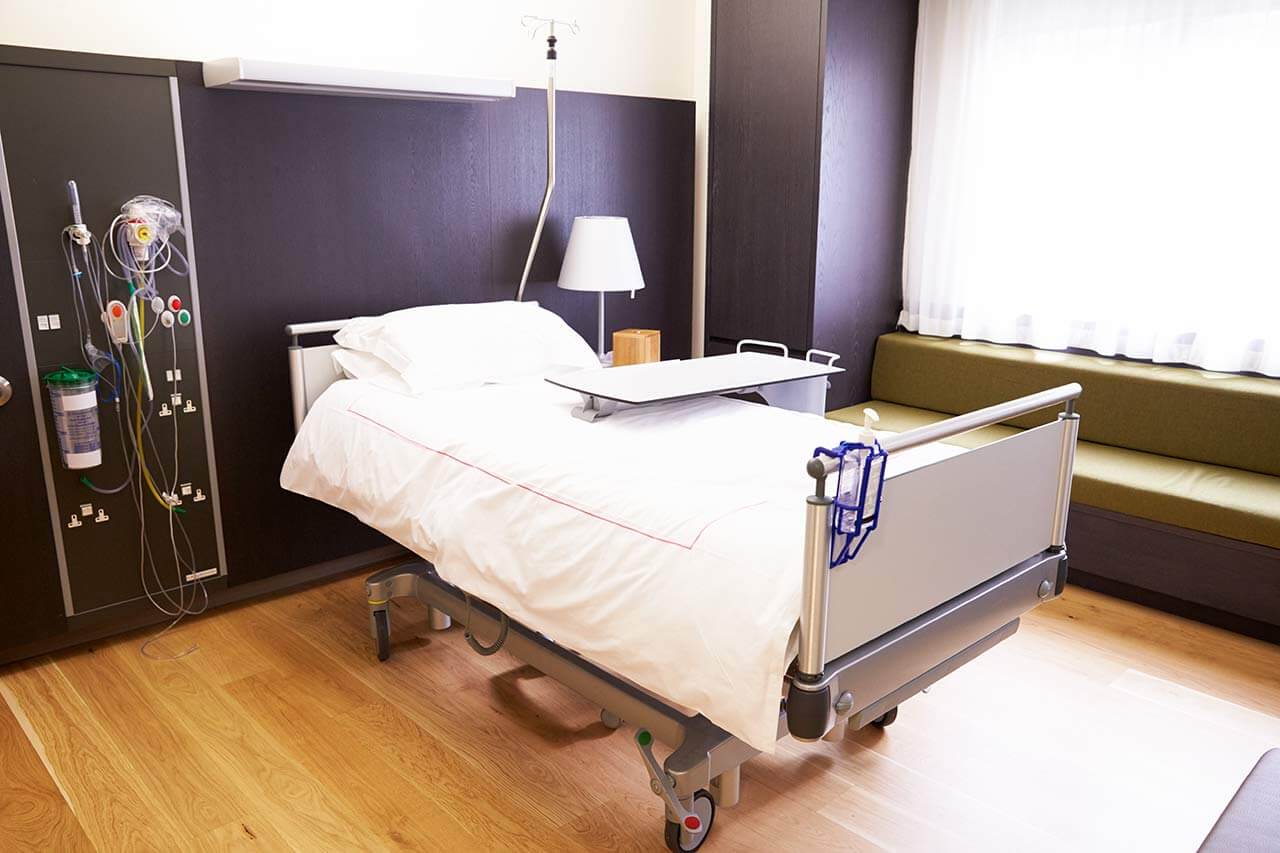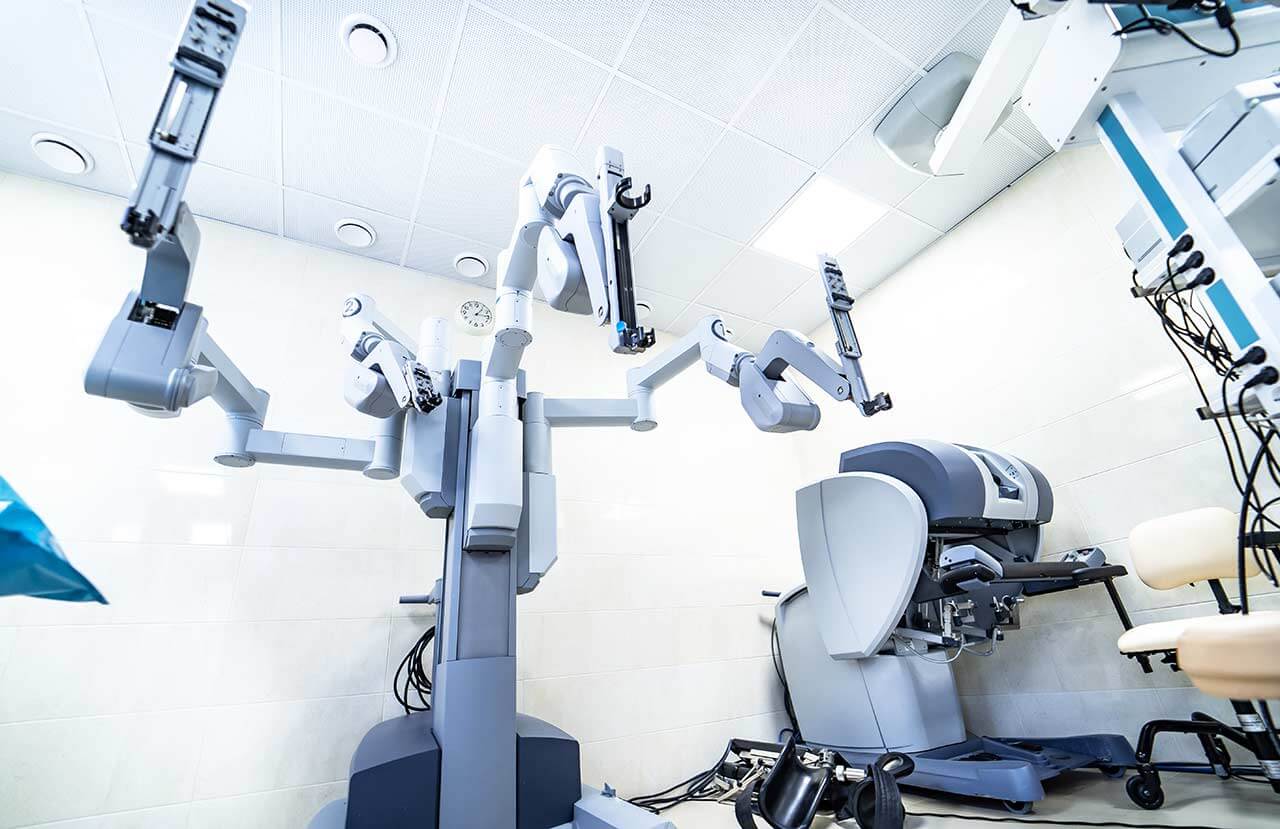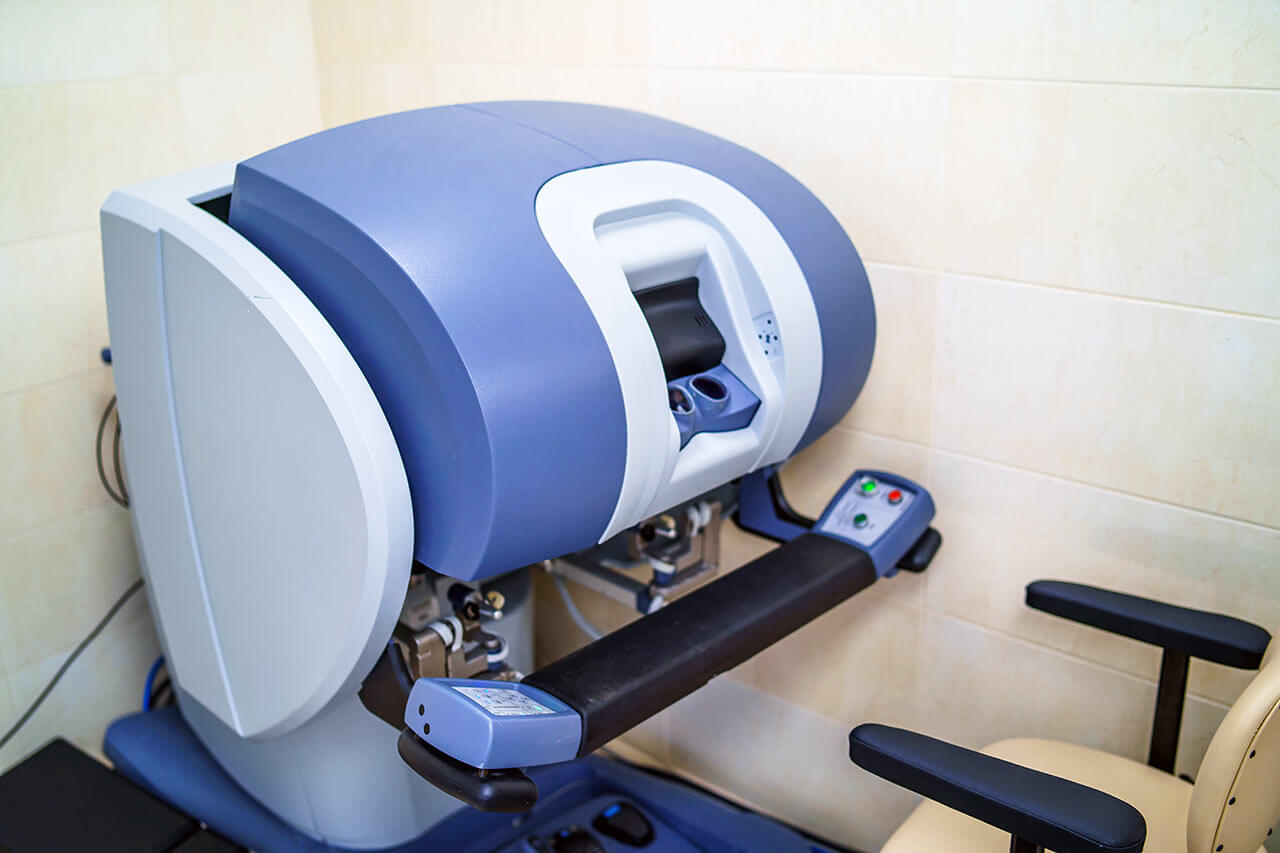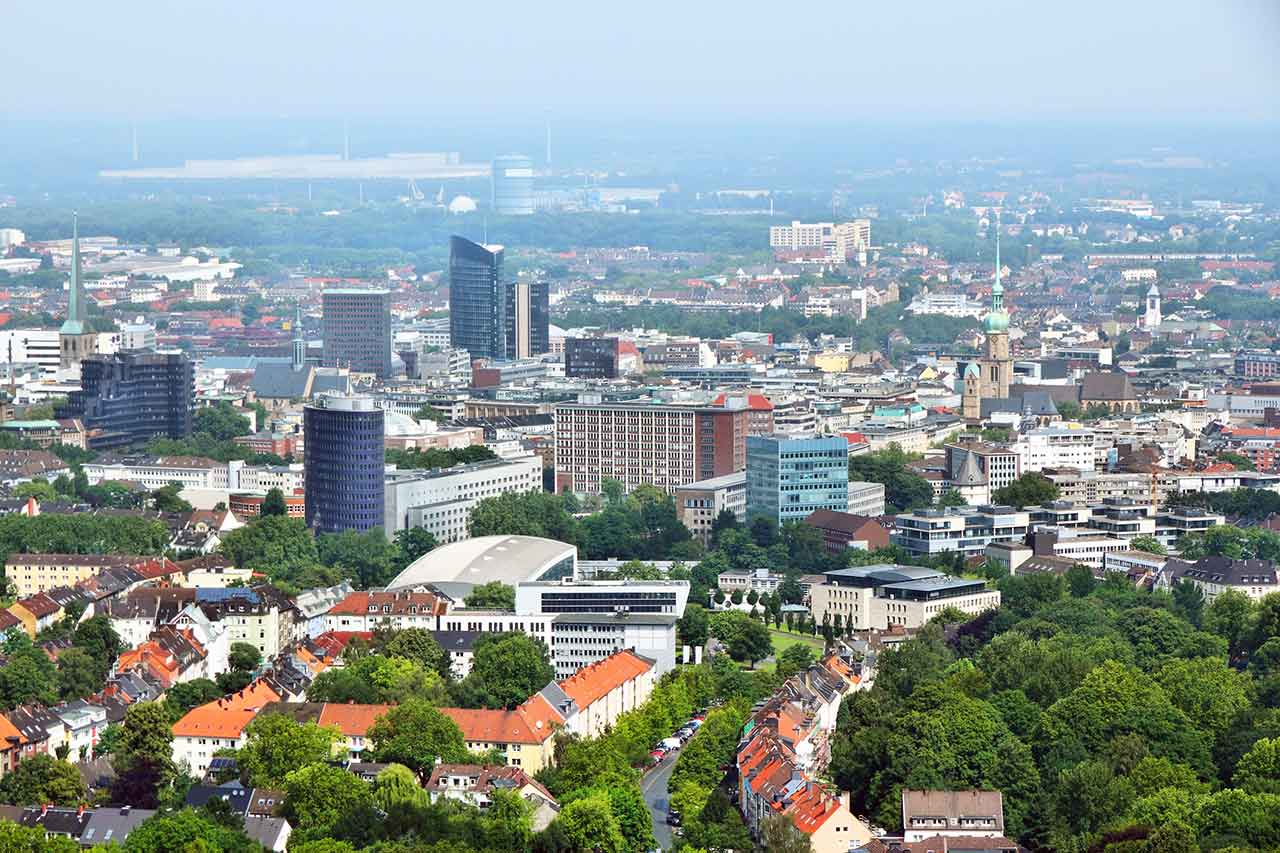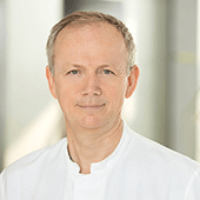
The program includes:
- Initial presentation in the clinic
- clinical history taking
- general clinical examination
- laboratory tests:
- complete blood count
- clinical urine test
- kidney function test (creatinine, urea)
- blood coagulation analysis (aPTT, PT, INR)
- inflammation indicators (CRP, ESR)
- complete hormonal analysis
- tumor marker
- abdominal ultrasound
- CT scan (on indication 650 €)
- MRI scan (on indication 1200 €)
- biopsy with histological examination (on indication 2000 €)
- nursing services
- consultation of related specialists
- consultation of the chief physician and all leading experts
- development of individual treatment plan
- written statement
Required documents
- Medical records
- MRI/CT scan (not older than 3 months)
- Biopsy results (if available)
Service
You may also book:
 BookingHealth Price from:
BookingHealth Price from:
About the department
According to the Focus magazine, the Department of Adult and Pediatric Urology, Urogynecology, Prostate Surgery and Andrology at the Knappschaft Hospital Dortmund has been ranking among the top German medical facilities specializing in prostate cancer treatment for many years in a row!
The department offers the full range of high-precision diagnostic examinations, conservative and surgical treatments for diseases of the male reproductive organs, urinary system in both men and women. The department admits not only adults, but also children with urologic diseases. The priority field of clinical practice is prostate cancer treatment. The high quality of medical services in this field is certified by the German Cancer Society. The department's highly qualified doctors successfully perform surgical procedures to treat prostate cancer (prostatectomy) using the innovative da Vinci Surgical System, which allows them to preserve erectile function, and also excludes the development of urinary disorders, which often develop after classical open surgery. Each patient of the department benefits from an individual treatment regimen with due consideration of his particular needs and wishes. The department is headed by Dr. med. Stefan Orth.
Prostate cancer is the most common diagnosis among men admitted to the department. The diagnostics and treatment of prostate cancer is carried out in the specialized Prostate Center, which is part of the department. The treatment of prostate cancer is carried out in an interdisciplinary collaboration of specialists from all related fields, who cooperatively elaborate the treatment tactics for achievement of a complete cure for the patient or a long-term remission. During the therapeutic process, the doctors use the very latest treatment methods in order to ensure a perfect result even in particularly complex clinical cases. It should be noted that the department's physicians regularly demonstrate high treatment success rates, while the frequency of cancer recurrences is very low. It is not surprising that the department admits not only German citizens for treatment, but also many patients from other European countries and far abroad.
The key to the successful treatment is high-quality diagnostics, and therefore the department has state-of-the-art devices for MRI and CT scanning, color duplex sonography, biopsy, including MRI-guided fusion biopsy. The comprehensive diagnostics allows the interdisciplinary tumor board to thoroughly assess the clinical case and select the set of treatment methods that will give the best result for the patient. In some cases, the doctors use only conservative methods, such as chemotherapy, hormone therapy, brachytherapy (a type of radiation therapy, in which a radiation source is placed into the prostate gland), active surveillance, if the pathology does not cause any symptoms and progresses very slowly. However, in most cases, prostate cancer requires prostatectomy. When choosing surgical treatment methods, the doctors always prefer minimally invasive interventions using the da Vinci Surgical System. Prostatectomy using the da Vinci Surgical System involves only a few small skin incisions, through which, under the guidance of a qualified surgeon, who is always at a special console, the special miniature surgical instruments are inserted using the robotic "slave manipulators". One of the "slave manipulators" of the robotic device has a fixed camera, which is inserted into the site of the operating field. The camera transmits images of the surgical field, which are displayed on a large screen with the possibility of multiple zooming. Thus, the surgeon can clearly see the smallest anatomical structures, thereby excluding damage to healthy tissue located near the pathological focus. The da Vinci "slave manipulators" provide a huge range of motion that the surgeon is unable to perform due to the physical capabilities of the human hand. In addition, robotic surgery eliminates the natural physiological hand tremors due to anxiety and other factors. Small skin incisions contribute to the rapid recovery of the patient after surgery, as well as significantly reduce the intake of painkillers due to the mild pain syndrome. Robot-assisted prostatectomy preserves erectile function and avoids damage to the bladder, which is often not possible to achieve with classical surgery.
The treatment of benign prostatic hyperplasia is also within the competence of the department's doctors. At the initial stages of the pathology, drug therapy using modern medications is sufficient in most cases. If drugs are ineffective, the department's medical team uses bloodless laser techniques (GreenLight laser) and minimally invasive surgical techniques – transurethral resection of the prostate (TUR), transurethral resection in saline (TURiS), open or laparoscopic adenomectomy. The selection of the surgical technique is determined strictly on an individual basis.
The department's specialists in the field of urogynecology deal with the treatment of all types of urinary incontinence in men and women, as well as with the treatment of pelvic organ prolapse in women. The department's doctors have rich and successful experience in open, laparoscopic and robot-assisted interventions for the treatment of urogynecologic diseases. The therapy for urinary incontinence in women is most often performed using the TVT and TVT-O sling procedures. Since 2004, the department has also been treating urinary incontinence by injecting botulinum toxin A into the bladder muscles. The innovative Advance® Band and Remeex®-MRS systems are used for the elimination of mild and moderate urinary incontinence in men. In the case of particularly severe types of urinary incontinence in men,the doctors perform surgery to implant an artificial urinary sphincter AMS 800®.
Andrology is also an important focus of the department's clinical work. The department's andrologists specialize in the diagnostics and treatment of erectile dysfunction, hormonal disorders in men, infertility, benign diseases of the testicles and penis. The patients diagnosed with infertility are offered such procedures as testicular sperm extraction (TESE) and intracytoplasmic sperm injection (ICSI). The most commonly used treatments for erectile dysfunction are drug therapy, vacuum pump therapy and SKAT therapy. The doctors in this field also perform male sterilisation, penile straightening surgery in the case of penile curvature (for example, Nesbit's procedure), foreskin removal (circumcision in phimosis) and other interventions.
The department's service range is complemented by the diagnostics and treatment of urologic diseases in children. The specially trained team of doctors with deep knowledge not only in the field of urology, but also in the field of pediatrics takes care of the health of young patients. Most of the diagnostic and therapeutic procedures for pediatric urologic diseases are performed on an outpatient basis, so the child does not need inpatient hospitalization. The most common diseases of the genitourinary system in children include undescended testes, polycystic kidney disease, renal duplication, hypospadias, urethral meatal stenosis, enuresis and infections of the urinary tract. The department's pediatric urologists have excellent qualifications in their field, and thus provide young patients with the highest quality treatment.
The main clinical focuses of the department include:
- Diagnostics and treatment of prostate cancer
- Active surveillance
- Chemotherapy
- Hormone therapy
- Brachytherapy
- da Vinci robotic prostatectomy
- Diagnostics and treatment of benign prostatic hyperplasia
- Drug treatment
- GreenLight laser therapy
- Transurethral resection of prostate adenoma (TUR)
- Transurethral resection in saline (TURis)
- Open or laparoscopic adenomectomy
- Diagnostics and treatment of pelvic organ prolapse, urinary incontinence in men and women
- TVT and TVT-O sling interventions in women
- Botulinum toxin A injections into the bladder muscles in women
- Treatment of urinary incontinence in men with the innovative Advance® Band and Remeex®-MRS systems
- Surgery to implant an artificial urinary bladder sphincter AMS 800® (only for particularly severe forms of urinary incontinence in men)
- Diagnostics and treatment of diseases of the kidneys, ureters, bladder and urethra, including cancer
- Minimally invasive surgery
- da Vinci robot-assisted surgery
- Treatment of kidney, ureter and bladder stones using extracorporeal shock wave lithotripsy, ureterorenoscopy, percutaneous nephrolitholapaxy, and mini-percutaneous nephrolitholapaxy
- Diagnostics and treatment of andrological disorders
- Infertility treatment (in cooperation with the Department of Reproductive Medicine)
- Testicular sperm extraction (TESE)
- Intracytoplasmic sperm injection (ICSI)
- Erectile dysfunction treatment
- Drug therapy
- Vacuum pump applications
- SKAT therapy
- Sterilization surgery for men
- Penile straightening surgery in the case of penile curvature (for example, Nesbit's procedure)
- Foreskin removal (circumcision in the case of phimosis)
- Infertility treatment (in cooperation with the Department of Reproductive Medicine)
- Diagnostics and treatment of urologic diseases in children (in most cases on an outpatient basis)
- Drug treatment
- Surgical treatment
- Other medical services
Curriculum vitae
Higher Education and Postgraduate Training
- 1985 - 1991 Study of Human Medicine at the Faculty of Medicine, University of Heidelberg.
- 08.1990 - 10.1990 Internship abroad.
- 1991 - 1992 Clinical practice in Urology.
- 05.1992 State Exam in Medicine.
- 12.1993 Doctoral thesis defense at the Faculty of Medicine, University of Heidelberg.
- 31.05.1994 Admission to medical practice, Stuttgart Regional Council.
- 20.05.2000 Board certification in Urology, Muenster.
- 31.01.2009 Additional qualification in Andrology, Muenster.
- 28.03.2009 Additional qualification in Tumor Drug Therapy, Muenster.
- 03.2009, 06.2009, 09.2009 Participation in a seminar on personnel management in Berlin.
Professional Career
- 11.1992 - 05.1994 Internship in Surgery, Augusta-Kranken-Anstalt Hospital, Bochum.
- 06.1994 - 10.1995 Assistant Physician, Department of Urology, Johanniter Hospital Oberhausen Sterkrade.
- 11.1995 - 08.2002 Assistant Physician, Department of Urology, Augusta-Kranken-Anstalt Hospital, Bochum.
- 09.2002 Senior Physician, Department of Urology, Evangelical Hospital Oberhausen.
- 09.2004 Senior Physician with management responsibilities, Department of Urology, Evangelical Hospital Oberhausen.
- 09.2007 Senior Physician, Department of Urology, Hospital Dortmund.
- 01.09.2008 Senior Physician with management responsibilities, Department of Urology, Hospital Dortmund.
- Since April 2012 Chief Physician of the Department of Adult and Pediatric Urology, Urogynecology, Prostate Surgery and Andrology at the Knappschaft Hospital Dortmund.
Clinical Interests
- Surgical treatment of urologic diseases.
- Minimally invasive surgery (laparoscopy).
- Robot-assisted surgery (da Vinci Surgical System).
- Surgical treatment of urinary incontinence and pelvic organ prolapse.
- Endourology.
- Urethral surgery.
- Reconstructive urology.
- Treatment of pediatric urologic diseases.
Memberships in Professional Societies
- German Society of Urology.
- North Rhine-Westphalia Society of Urology.
- German Society of Robotic Urology.
- Da Vinci Surgery Community.
- German Incontinence Society.
- International Continence Society (ICS).
- European Association of Urology.
Photo of the doctor: (c) Knappschaftskrankenhaus Dortmund
About hospital
The Knappschaft Hospital Dortmund is a progressive multidisciplinary medical complex providing high quality medical care according to international standards. The hospital was founded in 1958, therefore it has a long history and rich clinical experience. After the overhaul and extensive works on the expansion and modernization of the hospital, it is now rightfully considered one of the largest and best not only in Dortmund, but also in Germany. The medical facility is an academic hospital of the Ruhr-University Bochum, thanks to which it has access to innovative medical developments that it successfully applies in daily clinical practice. The hospital includes 14 specialized departments and 14 narrowly focused centers, many of which have received prestigious quality certificates from professional medical societies in Germany.
The hospital has 451 beds for inpatient hospitalization. It annually treats more than 21,000 inpatients and more than 46,000 outpatients, which confirms the impeccable quality of medical service and high credit of trust from the patients. More than 40,000 children have been born here since the opening of the hospital.
The hospital presents almost all fields of modern medicine, including oncology, urology, gynecology, general surgery, cardiology, neurology, gastroenterology, orthopedics, etc. In 2010, the Cancer Center of the hospital became the first medical facility in North Rhine-Westphalia, which was certified by the German Cancer Society. According to the reputable Focus magazine, the Prostate Center has been ranking among the best in its field of competence for many years in a row. In addition, since 2010, the hospital has been using the da Vinci Surgical System, which allows the doctors to perform minimally invasive interventions with maximum accuracy and guaranteed successful results. Robot-assisted surgery is most often used in the hospital for the treatment of urologic, gynecologic diseases, the treatment of colon cancer, as well as for interventions on the pancreas, spleen and adrenal glands.
In 2005, the hospital became the first medical center in Dortmund certified according to the KTQ (Cooperation for Transparency and Quality in Healthcare) standards, and since then this certification has been regularly confirmed. The KTQ certificate is a guarantee of the excellent quality of medical services, so the patients of the hospital can count on the effective treatment, responsive care, and strict adherence to all hygiene and safety standards.
Photo: (с) depositphotos
Accommodation in hospital
Patients rooms
The patients of the Knappschaft Hospital Dortmund live in comfortable rooms made in a modern design. Each patient room is equipped with an ensuite bathroom with shower and toilet. The standard patient room furnishing includes a comfortable automatically adjustable bed, a bedside table, a wardrobe, a table and chairs for receiving visitors, a TV and a telephone. All patient rooms have Wi-Fi. If desired, the patient can use a special service – rent an iPad (from 8:00 a.m till 16:00 p.m.).
The hospital also offers enhanced-comfort patient rooms, which correspond to the level of a luxury hotel. The furnishing of such patient rooms include a comfortable bed, a wardrobe, a desk and chairs, upholstered furniture, air conditioning, minibar, modern multimedia system with flat-screen TV, telephone, radio and Wi-Fi. The bathrooms of the enhanced-comfort rooms are equipped with all the necessary toiletries, towels and a hairdryer. In the lobby of the block with enhanced-comfort rooms, patients are offered fresh fruits, as well as soft and hot drinks.
Meals and Menus
The patient and the accompanying person are offered tasty and varied meals. Every day, the menu features 22 dishes prepared from the freshest products using the Sous Vide technique – cooking in a vacuum. Such cooking technique preserves all the nutrients and vitamins, ensuring a healthy and nutritious diet for patients.
The patients living in enhanced-comfort rooms are offered a separate menu for breakfast, lunch and dinner. Moreover, the patients are additionally provided with fruit juices, mineral water, coffee, tea, as well as pastries, cakes, fruits, yoghurts, cottage cheese and other snacks.
Further details
Standard rooms include:
Religion
The religious services can be provided upon request.
Accompanying person
During the inpatient program, an accompanying person may stay with the patient in the room or at a hotel. Our managers will help you choose the most suitable option.
Hotel
During the outpatient program, the patient may stay at the hotel. Our managers will help you choose the most suitable option.
